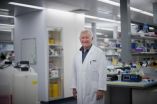(Press-News.org) Stem cells in the adult pancreas have been identified that can be turned into insulin producing cells, a finding that means people with type 1 diabetes might one day be able to regenerate their own insulin-producing cells.
The discovery was made by scientists from the Walter and Eliza Hall Institute and provides further evidence that stem cells don't only occur in the embryo.
The ability to produce the hormone insulin is crucial for controlling blood sugar (glucose) levels. In people with type 1 diabetes the body's immune system destroys the insulin-producing beta cells of the pancreas, leading to a potentially fatal elevation of blood glucose levels.
People with type 1 diabetes rely on multiple daily injections of insulin, or an insulin infusion pump, to control their blood glucose, but control is not perfect and they are at risk of serious long-term health complications.
Dr Ilia Banakh and Professor Len Harrison from the institute's Molecular Medicine division have not only identified and isolated stem cells from the adult pancreas, but developed a technique to drive these stem cells to become insulin-producing cells that can secrete insulin in response to glucose.
Professor Harrison said that insulin-producing cells had previously been generated from cells in the adult pancreas with 'stem cell-like' properties. "But what Dr Banakh has done is pinpoint the cell of origin of the insulin-producing cells and shown that the number of these cells and their ability to turn into insulin-producing cells increases in response to pancreas injury. This is exciting, because it means that the potential to regenerate insulin-producing cells is there in all of us, even as adults," Professor Harrison said.
"In the long-term, we hope that people with type 1 diabetes might be able to regenerate their own insulin-producing cells. This would mean that they could make their own insulin and regain control of their blood glucose levels, curing their diabetes. Of course, this strategy will only work if we can devise ways to overcome the immune attack on the insulin-producing cells, that causes diabetes in the first place," Professor Harrison said.
INFORMATION:
Professor Harrison is a clinician scientist whose research led to current clinical trials that could prevent type 1 diabetes. In recognition of his achievements, Diabetes Australia will tonight award Professor Harrison the Outstanding Contribution to Diabetes Award at its awards dinner marking World Diabetes Day.
The stem cell research, published this month in the journal PLOS One, was supported by the JDRF, the National Health and Medical Research Council of Australia and the Victorian Government.
Pancreas stem cell discovery may lead to new diabetes treatments
2012-11-14
ELSE PRESS RELEASES FROM THIS DATE:
Antibody-coated stents: Indication of disadvantages
2012-11-14
If narrowed or blocked coronary vessels have to be widened or opened, a vascular support (stent) is usually inserted. Drug-coated stents are preferred for patients at high risk of renewed narrowing of vessels (restenosis). However, the use of antibody-coated stents has been increasing in recent years. Current studies provide indications that these new antibody-coated stents more frequently lead to myocardial infarction and make re-operation necessary. This is the conclusion reached in the rapid report of the German Institute for Quality and Efficiency in Health Care (IQWiG), ...
'Missing link' discovered in the defence mechanism of the tuberculosis pathogen
2012-11-14
Brussels, 14 November 2012 – Flemish biologists lead by Joris Messens (VIB / Vrije Universiteit Brussel) have discovered that Mycobacterium tuberculosis – the bacterium that causes tuberculosis – has an ingenious defence mechanism against oxygen. This knowledge is important in the search for a treatment for tuberculosis. 9.4 million people are infected with tuberculosis annually and 1.7 million people die as a result.
Joris Messens: "We have discovered how Mycobacterium survives the oxygen stress in our body, namely with the aid of the protein mycoredoxin-1. This opens ...
Triclosan in cosmetics and personal care products can increase allergy risk
2012-11-14
Triclosan - an antibacterial chemical found in toothpaste and other products - can contribute to an increased risk of allergy development in children. This comes from the Norwegian Environment and Childhood Asthma Study, in which the Norwegian Institute of Public Health is involved. Similar results are reported in the USA.
Triclosan has been in use for decades, but was recently associated with allergies in children in an American study, the National Health and Nutrition Examination Survey (NHANES). The new Norwegian study found similar associations between allergies ...
New brain gene gives us edge over apes, study suggests
2012-11-14
Scientists have taken a step forward in helping to solve one of life's greatest mysteries – what makes us human?
An international team of researchers have discovered a new gene that helps explain how humans evolved evolved from apes.
Scientists say the gene – called miR-941 – appears to have played a crucial role in human brain development and may shed light on how we learned to use tools and language.
Researchers say it is the first time that a new gene – carried only by humans and not by apes – has been shown to have a specific function within the human body.
A ...
Babies born to stressed mothers more likely to be bullied at school
2012-11-14
Children whose mothers were overly stressed during pregnancy are more likely to become victims of bullying at school.
New research from the University of Warwick shows stress and mental health problems in pregnant women may affect the developing baby and directly increases the risk of the child being victimised in later life.
The study has been published in the Journal of Child Psychology and Psychiatry and is based on 8,829 children from the Avon Longtitudinal Study of Parents and Children (ALSPAC).
Professor Dieter Wolke, Professor of Developmental Psychology at ...
Study investigates headshaking in horses
2012-11-14
Headshaking syndrome is when a horse shakes or jerks its head uncontrollably for no apparent reason. There are striking clinical similarities between facial pain syndromes in people, most notably trigeminal neuralgia, and headshaking in horses. Although some progress has been made towards both diagnosing and treating the condition in horses, the pathology of the disease remains unknown and further research is needed.
A recent study led by academics from the University of Bristol's School of Veterinary Sciences and the University of Liverpool, evaluated the long-term ...
Enhancing breast cancer detection
2012-11-14
Straightforward imaging with an infrared, thermal, camera for detecting breast cancer early without the discomfort or inconvenience of mammography or biomolecular tests, according to a study to be published in the International Journal of Innovative Computing and Applications.
Tiago Borchartt of the Federal Fluminense University in Brazil and colleagues explain how breast thermography has up to now achieved an average sensitivity and specificity or approximately 90 percent for the detection of malignant tissue. The advantages of the technique are that it is painless, ...
Governing economic growth in the cloud
2012-11-14
Gross domestic product (GDP) can be boosted by cloud computing, the system in which remote computers on the Internet are used to store, manage and process data rather than the users' local machines. A report to be published in the International Journal of Technology, Policy and Management suggests that governments should collaborate to boost the adoption of cloud computing internationally.
Marco Iansiti of Harvard Business School and Gregory Richards of Cambridge-based Keystone Strategy, LLC, have found that cloud computing is likely to extend economic growth by increasing ...
Melting glaciers raise sea level
2012-11-14
This press release is available in German.
Since 1900 the global sea level has risen by approximately 20 cm. Melting glaciers are one of the causes – along with warming and thereby expanding sea water, melting Greenland and Antarctic ice sheets, and changing terrestrial water storage in dammed lakes and groundwater reservoirs. A team of scientists at the University of Innsbruck has now assessed the contribution of melting glaciers to sea level rise during the 20th century. They numerically modeled each of the world's roughly 300 000 glaciers and used thousands of on-site ...
A risk gene for cannabis psychosis
2012-11-14
Philadelphia, PA, November 14, 2012 – The ability of cannabis to produce psychosis has long been an important public health concern. This concern is growing in importance as there is emerging data that cannabis exposure during adolescence may increase the risk of developing schizophrenia, a serious psychotic disorder. Further, with the advent of medical marijuana, a new group of people with uncertain psychosis risk may be exposed to cannabis.
For these reasons, it would be valuable if a biological test could be developed that predicted the risk for developing cannabis ...

